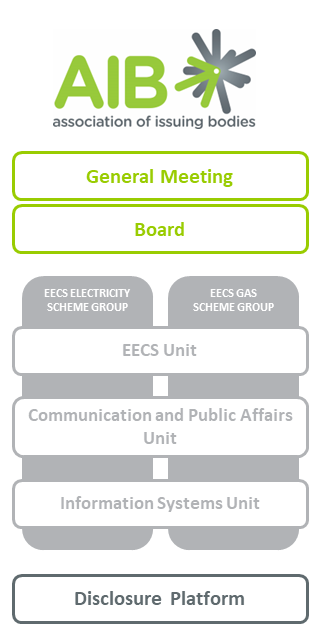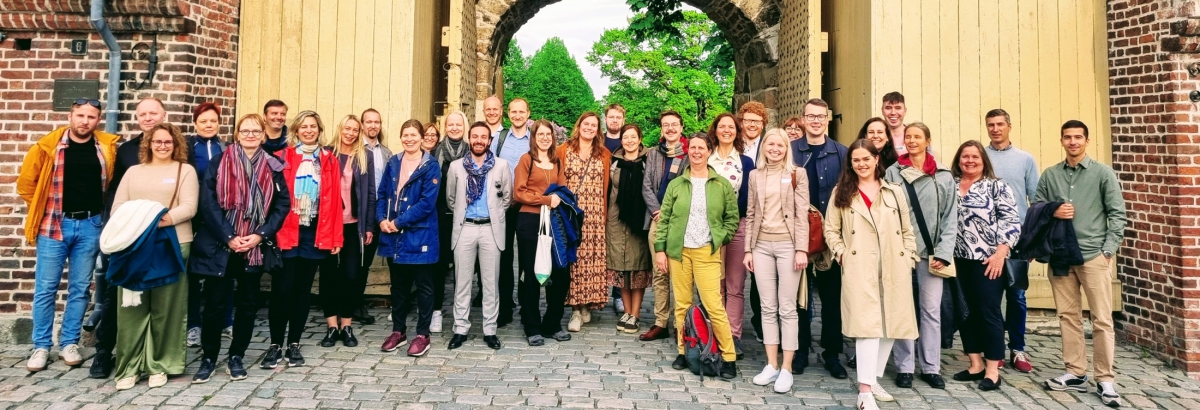Organisation
The AIB consists out of the board, general meeting, Units, Scheme Groups, task forces and the secretariat.
Secretariat
The AIB secretariat is a small and dynamic team, headed by our secretary general Liesbeth Switten.
The Board
The Board is responsible for the management of the AIB and had residual powers. It meets monthly, alternating physical meetings with teleconferences. The general cycle of meetings is organised so that budgetary plans are approved at the December General Meeting. More information on this link.
The Units
Units meet as necessary, sometimes monthly but more usually bi-monthly. These address ongoing issues, such as:
- Regulation of the Association
- Development of the EECS standard
- Registry-registry communications
- Communications with members and third parties.
The Scheme Groups
Scheme groups deal with issues related to specific energy carriers. They consist of the Scheme Members of a specific EECS Scheme, for a start:
a. Electricity Scheme group
b. Gas Scheme group
Each Scheme Group is responsible for its own budget and way of decision making:
- Set the level of Group Membership fees (within the minumum and maximum determined by the GM)
- Approve the Scheme Group budget
- Appoint and dismiss chair of Scheme Groups
- Organise events for external partiesAmend the Scheme specific parts of the EECS Rules
- Approve and amend EECS Rules template for "Standard Terms and Conditions" between members and Market Participants and
- Approve DP changes
- Approve member audits

The General Meeting
The General Meeting gathers all AIB members. It used to meet quarterly at varying locations in Europe, but after the reorganisation this is brought back to two meetings. Its decisions are advised by the Units, Scheme Groups and Task Forces, and implemented by the Board and Secretariat.
Competences
- Approval of the long term vision and of an annual strategy roadmap as elaborated by the Board
- Approval of the annual action plan
- Dissolve the Association and appoint liquidators
- Transformation of the Association into another form (e.g. a corporation)
- Change to the methods of calculating voting rights and voting procedures within the GM
- Entering into contracts with organisations and professional advisors above the threshold of 30.000 Euro
- Exclusion of AIB members from the association
- Admit new EECS scheme members
- Set the minimum and maximum level of membership Fees
- Approve the annual association budget and the end-of-year accounts
- Participate in EU projects
- Annual discharge of Board members
- Appoint and dismiss members of the Board
- Appoint and dismiss chair of Board
- Appoint and dismiss treasurer
- Appoint and dismiss vice-Chair and vice-Treasurer
- Determine the remuneration, if any, of the Chairperson, vice-chairperson, treasurer and vice-treasurer
- Choose, appoint and dismiss the Association’s external auditors
- Appoint and dismiss the secretary general of the Association , and set their remuneration,
- Amend the Articles of Association
- Annual validation of all changes to the EECS Rules
- Internal Rules
- AiB Procurement Policy
- Code of Conduct for Board members and officials
- Guidelines for Public Communication
AIB Meetings tend to be over a two-day period, to enable decision-making at both working and executive levels, sometimes in traditional conference rooms and occasionally in a less formal setting. There is a social event associated with meetings, usually dinner, to give members the opportunity for informal discussions.

The Task Forces
Task Forces are formed to address individual, time-bounded issues. In the past, these have examined such matters as:
- fee structures
- development of new EECS Products
- the development of the international residual mix
- the development of the AIB inter-registry Hub
- specific EECS business processes
- development of recommendations for members to protect against financial fraud
